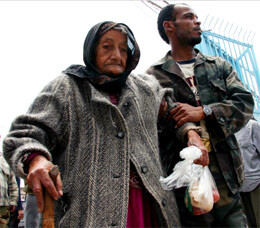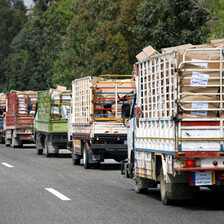Electronic Lebanon 23 May 2007

An elderly woman arrives at Kawkab School in Beddawi camp where an estimated 10,000 Palestinians from Nahr al-Bared have fled. (Hugh Macleod/IRIN)
“We estimate 10,000 people have entered Beddawi camp since late afternoon yesterday [Tuesday],” Nadar Abdel Ghani, head teacher at Kawkab School in Beddawi camp, told IRIN.
“We have around 1,500 people in each of our three schools here and the rest are staying with families in the camp, sometimes 40 people to a room.”
Up to 40,000 civilians had been trapped in Nahr al-Bared as fighting between the Lebanese army and radical Sunni group Fatah al-Islam entered its fourth day. The Lebanese army — which, under a 1969 Arab agreement, does not enter any of Lebanon’s 12 Palestinian refugee camps — has been bombarding positions in the camp suspected to be held by Fatah al-Islam fighters.
However, many camp residents say tank and artillery fire has been indiscriminate.
Dozens of dead civilians
More than 80 people have been killed in the fighting, according to news agencies, including 22 militants and 32 soldiers. Camp residents and doctors say there are dozens of dead civilians.
Late on Wednesday, a source in the Lebanese Ministry of Defence told IRIN the army was planning a possible attack to flush out remaining Fatah al-Islam fighters after receiving a green light to go into the camp from Sultan Abul Aynain, Fatah’s chief in Lebanon. Fatah, a major Palestinian political party, is the largest Palestinian faction inside Nahr al-Bared and a secular rival to Fatah al-Islam.
“The plan is to evacuate as many civilians as we can before attacking the camp in a few hours,” said the source, who requested anonymity as he was not authorised to speak to the media. The claim has not been officially confirmed, but if Lebanese forces do enter Nahr al-Bared, it will break a decades-old precedent and raise the possibility of the army exerting security control inside Lebanon’s 11 other refugee camps.
Currently, the responsibility for security in the camps lies with the Palestinians themselves.
2,000 families flee
Earlier on Wednesday, the United Nations relief agency for Palestinians (UNRWA) estimated that about 2,000 families, which average at least five members per family, had fled Nahr al-Bared since Tuesday evening.
The International Committee of the Red Cross (ICRC) on Wednesday distributed food parcels to last five days for 3,000 people in Kawkab School, where displaced people — the majority women, children and infants — are living in filthy conditions.
“Today’s distribution went well. People left Nahr al-Bared with absolutely nothing and so this was simply a first delivery of food, medicine and water,” Caroline Terink, economic security coordinator for the ICRC, told IRIN at Kawkab School.
Parcels of food aid from the Bahir Hariri foundation were also being distributed to families in Kawkab School on Wednesday. Bahir Hariri is the sister of slain former premiere Rafik Hariri.
The ICRC remained unable to access Nahr al-Bared camp directly and UNRWA did not access it on Wednesday, instead focusing on distributing emergency food aid to displaced people in Beddawi.
UN convoy fired on
On Tuesday, a UNRWA convoy reportedly came under fire from positions held by the Lebanese army, after moving only a few hundred metres into the camp. The army appeared to be targeting Fatah al-Islam positions close to the convoy.
Eyewitnesses told IRIN that the UNRWA convoy had been told by Fatah al-Islam fighters to move as it was obstructing their line of sight. Then, two civilians were killed as they tried to collect bread and other supplies from the relief agency’s convoy.
“The shells landed right beside us,” said Ibrahim Jundi, a resident of Nahr al-Bared. “Two men were injured in their legs by shrapnel. A neighbour of mine, Jihad Abdel Ezz, was hit in the stomach and died soon after, while Abdullah Mansour died instantly after being hit in the neck.”
Nadim Houry, a researcher for NGO Human Rights Watch, interviewed families in Kawkab School and said he had heard the same story and confirmed the names of the dead men. Houry said the Lebanese army had failed to observe international humanitarian law in its bombardment of civilian areas in the camp.
‘Army disregarded humanitarian law’
“We do not believe the army directly targeted civilians, but in its use of indiscriminate shelling, which has a disproportionate affect on civilians to combatants, the army has failed under its obligations to humanitarian law,” Houry told IRIN.
“We are also concerned that the army failed to provide safe corridors for the evacuation of civilians and the delivery of aid. It has taken three days for this to happen.”
Hoda al-Turk, a spokeswoman for UNRWA, confirmed that its convoy had come under fire yesterday and that three trucks had been hit, rendering them disabled and abandoned in the camp. Turk said UNRWA had contacted the concerned parties and that the Lebanese army had denied firing on the convoy.
The Lebanese army yesterday issued a statement denying it had shot at civilians and saying it only targeted positions held by Fatah al-Islam.
Bissan and Bassam al-Saadi left their home in Nahr al-Bared with their four children, including an 11-month-old toddler, at dawn on Wednesday morning.
“Three days with no food and no bread”
“Three days with no food and no bread,” screamed Bissan, cradling her baby who has been suffering respiratory problems from the dust thrown up by the bombardment of their neighbourhood.
“We left everything behind and started out on foot,” she said, tears welling in her eyes. “At last we were picked up by a bus and driven out of the camp.”
The Palestinian Red Crescent (PRC) and Lebanese Red Cross (LRC) provided buses to help evacuate civilians.
The PRC reported unrestricted access to the camp since Wednesday morning, according to Dr Yousef Assad of Safad Hospital in Bedawi camp.
A total of 130 civilians were evacuated to Safad Hospital. They suffered severe injuries as well as shock with 12 undergoing emergency surgery, said Dr Assad.
The LRC remains on the edge of the camp ferrying the wounded to local hospitals.
The al-Saadi family received medicine from a makeshift clinic set up by the LRC in the playground of Kawkab School.
“We didn’t bring Fatah al-Islam into the camp. Of course we support the Lebanese army’s fight against them but they have destroyed houses and killed civilians,” said Bassam al-Saadi, who said he knew of 13 bodies which had been buried in the camp cemetery since Sunday.
“It look like Dahiyeh,” shouted a Nahr al-Bared resident, referring to the southern suburb of Beirut which was bombed heavily by Israeli jets in last summer’s war with Hezbollah.
“Even the Israelis have never done to us what the Lebanese army have done,” shouted another evacuee.
This item comes to you via IRIN, a UN humanitarian news and information service, but may not necessarily reflect the views of the United Nations or its agencies. All IRIN material may be reposted or reprinted free-of-charge; refer to the copyright page for conditions of use. IRIN is a project of the UN Office for the Coordination of Humanitarian Affairs.
Related Links


